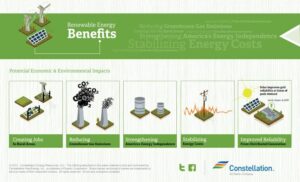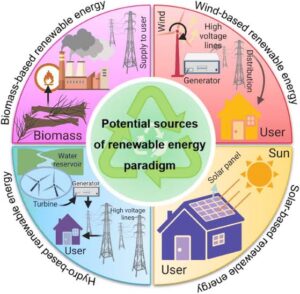Back to: Environmental Biology 300 Level
Welcome to class!
Hello, intelligent one! Have you ever felt the frustration of NEPA taking light in the middle of an important task? Or perhaps you’ve seen how petrol and diesel generators pollute the air around homes and businesses? These are just everyday examples of why we need cleaner, more reliable sources of energy. Today’s lesson focuses on renewable energy—energy that’s not only sustainable but also kind to the environment.
Renewable Energy And Environmental Benefits
What is Renewable Energy?
Renewable energy is energy that comes from natural sources that are constantly replenished. These include sunlight, wind, water (hydropower), biomass, and geothermal heat. Unlike fossil fuels such as coal, oil, and gas, renewable sources do not run out and don’t pollute the environment.

In Nigeria, where sunlight is abundant and rivers are flowing across regions, we are rich in renewable energy opportunities—yet underusing them.
Types of Renewable Energy Sources
Solar Energy – Captured from the sun using solar panels. Nigeria has high solar potential, especially in the northern states like Sokoto, Borno, and Yobe.
Wind Energy – Generated by wind turbines. Wind farms are most feasible in coastal areas and elevated regions like Jos Plateau.
Hydropower – Produced by flowing water, often from rivers or dams. Nigeria already uses hydropower from places like Kainji Dam.
Biomass – Comes from organic materials like agricultural waste, wood, and animal dung. Common in rural areas where firewood is used.
Geothermal Energy – Heat from within the earth, though less developed in Nigeria due to geological limitations.
Environmental Benefits of Renewable Energy
Reduces Air Pollution – Solar and wind energy produce no smoke or harmful gases.
Combats Climate Change – Fewer greenhouse gases like carbon dioxide are released, which helps slow global warming.
Preserves Ecosystems – Unlike mining or drilling, renewable energy does not destroy large areas of land or pollute rivers.
Supports Public Health – Cleaner air and water mean fewer respiratory and waterborne diseases.
Reduces Waste – Biomass energy makes use of farm and household waste, reducing landfill use.
Economic and Social Benefits
Job Creation – Installing and maintaining solar systems, wind turbines, and bioenergy facilities creates employment.
Energy Access – Off-grid solar helps rural communities get electricity where national grid access is limited.
Cost Efficiency – Though initial installation can be expensive, renewable energy becomes cheaper in the long run with low maintenance costs.
Challenges of Renewable Energy in Nigeria
High initial cost of technology and infrastructure

Poor awareness and technical skills
Weak policies and lack of investment incentives
Limited research and local manufacturing
Still, with proper education, policies, and support for innovation, Nigeria can shift from fuel scarcity to energy sustainability.
Summary
- Renewable energy is derived from natural, replenishable sources like sun, wind, water, and biomass.
- Nigeria has great potential for solar, hydropower, and biomass energy but underuses them.
- Renewable energy reduces pollution, fights climate change, and improves health and ecosystems.
- Social and economic benefits include job creation, energy access, and cost savings over time.
- Challenges include high initial costs, poor infrastructure, limited awareness, and weak policy implementation.
Evaluation
- Define renewable energy and give two examples relevant to Nigeria.
- List three environmental benefits of using renewable energy.
- What are two major challenges of renewable energy in Nigeria?
- How can renewable energy improve rural communities?
Fantastic effort today! Your growing understanding of renewable energy puts you at the heart of building a cleaner, greener, and more sustainable Nigeria. Keep going strong—Afrilearn is always by your side to support your journey to greatness!
